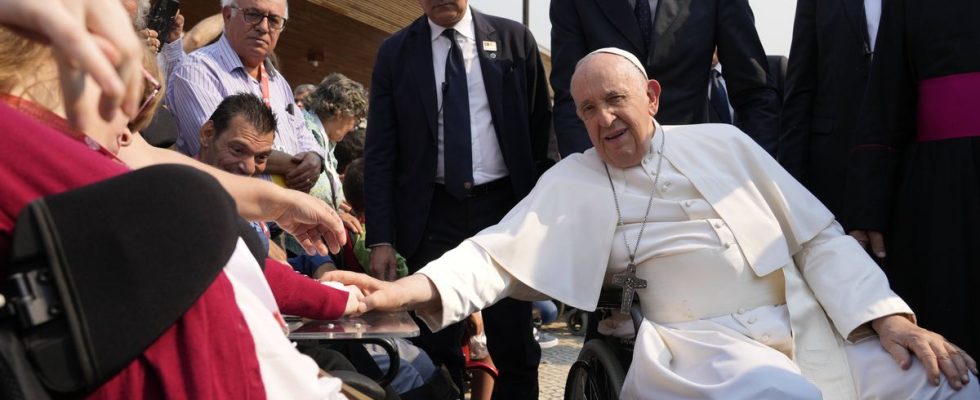Marseille, where Pope Francis is expected on Friday, is one of the major ports of the Mediterranean, shaped since its foundation by waves of migration and where communities and religions coexist. Two strong themes of this visit. “I will go to Marseille, not to France,” insisted the head of the Catholic Church on several occasions, explaining: “The problem that concerns me is the Mediterranean problem.” First of all, the fate of migrants, he who made his first papal trip to the Italian island of Lampedusa, where they have been arriving by the thousands for years and which is currently experiencing a new influx.
The Pope regularly denounces “indifference” in the face of dramatic shipwrecks, which have left more than 28,000 people missing in the Mediterranean since 2014 according to the International Organization for Migration. “The founding principle of this city is an alloy between people from elsewhere and people from here,” summarizes Thierry Fabre, founder of the “Rencontres d’Averroès” which for thirty years has brought together intellectuals and artists in Marseille to “think the Mediterranean from both shores. And to recall the mythical origin of the “Phocaean city”, the union between Protis, a Greek sailor who arrived 2,600 years ago from Phocaea (in present-day Turkey), and Gyptis, daughter of the chief of a local tribe. “When we look over the long term, this story is maintained, it metamorphoses but it maintains itself,” he continues.
“Seismograph city”
A history shaped by trade, particularly colonial trade, which made the city rich, but also by wars, poverty, disasters… “Every time there is a great historical shock, there is an aftershock in Marseille, it’s the seismograph city,” notes Mr. Fabre. It has thus successively welcomed – and without exhaustiveness – Greeks, Italians, Armenians, Jews from Central Europe or North Africa, North Africans, Comorians, more recently Ukrainians or “sub-Saharan” Africans, survivors of the perilous crossing of the “great blue”.
Pope Francis is “one of the only ones to have such strong words (…), he never stops denouncing this tragedy” in this Mediterranean which has become a cemetery, “and reminding us that it must stop”, underlines François Thomas , president of SOS Méditerranée, an NGO based in Marseille which charters the Ocean Viking, a ship rescuing migrants in distress, particularly off the coast of Libya.
“Since the Middle Ages there has been a significant foreign presence”
But in Marseille, as elsewhere, the settlement of migrants does not take place without problems, even if “since the Middle Ages there has been a significant foreign presence, of traders but also of more modest populations, who have nourished the economy and the expansion of the city,” underlines Stéphane Mourlane, lecturer in contemporary history at the University of Aix-Marseille.
“This cosmopolitanism was also felt to be threatening,” recalls the researcher, who co-directed an “Atlas of Migration in the Mediterranean”. The city has thus experienced outbreaks of xenophobic violence, against Italians in 1881 for example. Without slowing down arrivals, since “on the eve of the First World War, a fifth of the population of Marseille was Italian”. Other violent episodes targeted the North Africans in 1973. “After independence, Marseille very strongly refused the plurality of its population,” analyzes Thierry Fabre.
However, Marseille is “a fairly good-natured, human city, where people live together,” notes Blandine Chelini-Pont, professor of contemporary history at the University of Aix-Marseille, specializing in questions of religion. “Does that mean welcoming and religious tolerance” or simply “an aggregate of communities that do not interact”?
The city, which has, among other things, some of the largest Jewish and Muslim communities in France, has in any case had a body since 1990 bringing together representatives of the main religions around the mayor, “Marseille spérance”, to promote dialogue and defuse possible tensions. Because the country’s second city also suffers “from a lot of problems and discrimination”, recalls Ms. Chelini-Pont.
“Everyone knows that in identity there is always a factor of otherness”
The Marseille city has some of the poorest neighborhoods in Europe, often with a large population of foreign origin. This summer, for the first time, it was affected by the urban violence which shook France. Marseille is celebrated for its values of “openness and mixing” but also has a “bad reputation” for violence, notes Stéphane Mourlane.
And for Thierry Fabre, “the whole question is that of the hyphen. This is the invention that Marseille can be.” Because here “everyone knows that in identity there is always a factor of otherness”, estimates Jean-Marc Aveline, the archbishop of Marseille, who extended the invitation to the pope. We come from elsewhere, but “you arrive, you like this city, very quickly you are Marseillais, you can be proud of it, and too bad if you don’t have your papers, you will have them later. You have an identity, and that matters. We are somewhere, we belong.”

